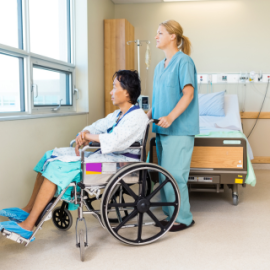A Zero Suicide perspective on the National Patient Safety Goal on suicide prevention in health care settings.
Learn how Zero Suicide helps systems meet standards.
The Joint Commission National Patient Safety Guidelines are designed to improve the quality and safety of care for those who are being treated for behavioral health conditions and those who are identified as high risk for suicide. Fidelity to Zero Suicide can help organizations meet and exceed these standards on the way to safer suicide care.

Meeting Accreditation Standards Series
Joint Commission's NPSG 15.01.01 applies to all patients in organizations surveyed under the Behavioral Healthcare standards, all patients in psychiatric hospitals, any patient in a general hospital who is being treated or evaluated for a behavioral condition as their primary reason for care, and all patients who express suicidal ideation during the course of care regardless of their registration status.
For this video series, Zero Suicide experts have collected commonly encountered questions by organizations and will offer guidance and observations on how to meet NPSG 15.01.01. While meeting NPSG 15.05.01 standards is not the equivalent of adopting and implementing the full Zero Suicide framework, there is overlap and the Zero Suicide website provides additional information about implementing comprehensive evidence-based suicide care.
For more resources around accreditation standards, follow this link:
Series Experts
Julie Goldstein Grumet, PhD
- Director, Zero Suicide at Education Development Center
- Senior Health Care Advisor at Suicide Prevention Resource Center
- Senior Health Care Advisor, Suicide Prevention Resource Center
Brian Ahmedani, PhD
- Director, Center for Health Policy & Health Services Research, Henry Ford Health System
- Director of Research, Department of Psychiatry, Henry Ford Health System
- Senior Scientist, Henry Ford Health System
Ed Boudreaux, PhD
- Professor of Emergency Medicine, Psychiatry, and Quantitative Health Sciences, University of Massachusetts Medical School


